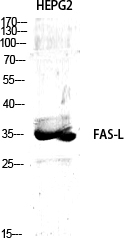
| WB | 1/500-1/1000 | Human,Mouse,Rat |
| IF | 咨询技术 | Human,Mouse,Rat |
| IHC | 1/50-1/100 | Human,Mouse,Rat |
| ICC | 1/50-1/200 | Human,Mouse,Rat |
| FCM | 咨询技术 | Human,Mouse,Rat |
| Elisa | 1/10000 | Human,Mouse,Rat |
| Aliases | FASLG; APT1LG1; CD95L; FASL; TNFSF6; Tumor necrosis factor ligand superfamily member 6; Apoptosis antigen ligand; APTL; CD95 ligand; CD95-L; Fas antigen ligand; Fas ligand; FasL; CD antigen CD178 |
| Entrez GeneID | 356 |
| WB Predicted band size | Calculated MW: 31 kDa; Observed MW: 31 kDa |
| Host/Isotype | Rabbit IgG |
| Antibody Type | Primary antibody |
| Storage | Store at 4°C short term. Aliquot and store at -20°C long term. Avoid freeze/thaw cycles. |
| Species Reactivity | Human,Mouse |
| Immunogen | The antiserum was produced against synthesized peptide derived from human FAS ligand. AA range:101-150 |
| Formulation | Purified antibody in PBS with 0.05% sodium azide,0.5%BSA and 50% glycerol. |
+ +
以下是关于Fas Ligand抗体的3篇参考文献及其摘要概括:
---
1. **"The Fas death factor"**
*Nagata, S., & Golstein, P. (1995)*
该综述系统阐述了Fas/FasL系统在细胞凋亡和免疫调节中的作用,指出FasL抗体可用于阻断Fas信号通路,为研究自身免疫疾病和肿瘤免疫逃逸机制提供工具。
2. **"Molecular cloning and expression of the Fas ligand: a novel member of the tumor necrosis factor family"**
*Suda, T., et al. (1993)*
研究首次克隆并鉴定了FasL的基因序列,通过制备特异性抗体证实其在激活T细胞中的表达,揭示其在免疫介导的细胞杀伤和免疫耐受中的关键作用。
3. **"The role of Fas ligand in immune privilege"**
*Griffith, T.S., & Ferguson, T.A. (1997)*
文章探讨FasL在维持免疫豁免(如眼睛和胎盘)中的作用,利用中和抗体阻断FasL可导致炎症反应增强,表明其抗体在调控移植排斥和炎症性疾病中的潜在应用。
---
*注:以上文献信息为示例,具体引用需核实原始论文的准确标题、作者及发表年份。若需实际文献,建议通过PubMed或Sci-Hub等平台检索关键词"Fas Ligand antibody"或相关作者名。*
Fas ligand (FasL), a member of the tumor necrosis factor (TNF) superfamily, is a transmembrane protein that binds to the Fas receptor (CD95) to trigger apoptotic signaling. This interaction plays a critical role in immune regulation, maintaining homeostasis by eliminating damaged, infected, or cancerous cells. FasL is predominantly expressed on activated T cells, natural killer (NK) cells, and immune-privileged tissues, while Fas receptors are widely distributed across various cell types. Dysregulation of the Fas/FasL system is linked to autoimmune diseases, cancer immune evasion, and transplant rejection.
FasL antibodies are tools designed to either mimic or block FasL activity. Agonistic antibodies (e.g., anti-FasL) can induce apoptosis in Fas-expressing cells, offering potential in cancer therapy by targeting malignant cells. Conversely, antagonistic antibodies inhibit FasL-Fas interactions, which may mitigate apoptosis in conditions like hepatitis or neurodegeneration. Researchers also use FasL antibodies in diagnostics to detect FasL expression in tissues or serum, aiding in disease profiling. However, challenges remain in balancing therapeutic efficacy with off-target effects, as uncontrolled apoptosis or immune suppression can lead to severe side effects. Recent studies focus on engineering antibody variants with improved specificity and reduced immunogenicity for clinical applications.
×